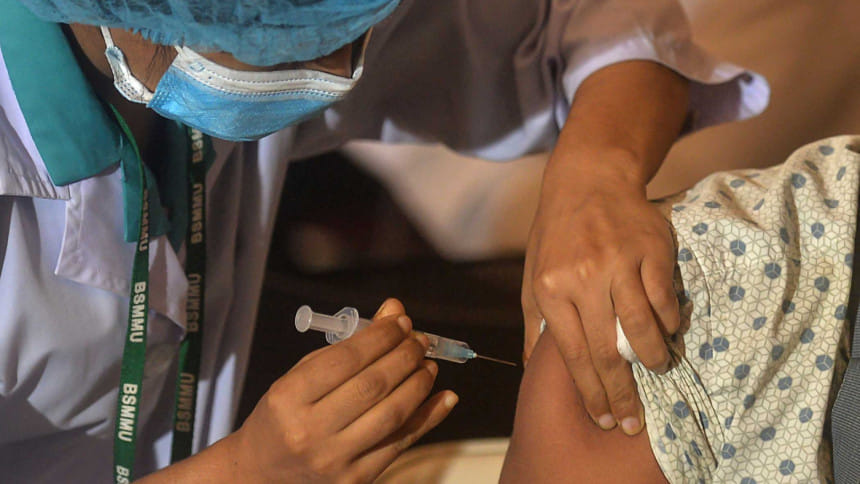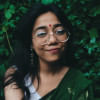Third in gender, last in line?

Weighed down under the stacks of reports about crowding at vaccination centres, shortage of vaccine doses, and the rocky mass vaccination drives, is the story of how a section of Bangladeshi population is suffering from bias and a lack of access to the jabs, leaving them unprotected against the coronavirus. If this discrimination is not dealt with quickly, then not only will this community continue to suffer, but it will be seen as a grave medical and moral failure of the country as well.
The official figure for Bangladesh's third gender population, commonly referred to as hijra, is a perfectly—and suspiciously—rounded 10,000, according to a 2013 survey by the Ministry of Social Welfare. However, the real number has not only increased in the decade or so since then, but can also be assumed to be inaccurate, according to organisations working on the rights of the community.
While Article 28 of Bangladesh Constitution dictates that there can be no discrimination against any citizen based on religion, race, caste, sex, or place of birth, it was not until late 2014 that the government officially recognised the transgender community as the "third gender." Those who had already registered for their national ID (NID) cards before that time had to do so using the name and gender specified on their birth certificate. Now that the NID is still the only document using which the general populace can register for the Covid-19 vaccine, third gender people are being subjected to even more discrimination and trauma on the basis of their gender identity.
The story of Tanisha Yasmin Chaity, as reported by this daily last month, is the epitome of what the transgender people fear they will have to face at vaccination centres. A young transwoman and a development worker based in Cox's Bazar, Chaity's experience tells us all we need to know about how unfair this country's treatment of this community still is. As she stood in the female queue at the vaccination centre, Chaity was anxious about being subjected to harassment at the inoculation booth itself, while those in line were uncomfortable due to their ingrained bigotry. And she was not wrong about being harassed: when the man at the desk called her by her registered birth name, Mamun Mollah, and she appeared, he seemed to be unaware of the term "transwoman." Chaity argued with him, trying to justify why she should be able to get her vaccine too. This, unfortunately, only attracted taunting from others in the queue. When she was eventually able to convince the clerk to let her go to the inoculation booth for females, the same type of ignorance was displayed by the staff there, causing Chaity further humiliation.
As appalling as it sounds, the bias of regular people against those belonging outside the gender binary of male and female is somewhat understandable (for lack of a better word). After all, discrimination against transgender people is the norm of our culture, and they are essentially deprived of any decent treatment in everyday life. Most people don't know any better, and don't feel the need to peek outside of their bigoted cocoon either. But what excuse can healthcare workers of the state show for not even being aware of transgenderism, and consequently making an already cumbersome procedure even more difficult for people like Chaity? Given that those running the vaccination centres are representatives of the government, are they not also obliged to abide by Article 28 and equally accommodate all citizens of the country who want to be vaccinated?
While Chaity did finally get her first dose, stories such as hers wherein people of this community managed to get vaccinated—albeit with difficulty—are few and far between. But since they don't attract much news coverage and the government is not very forthcoming about their plight, we don't know if remedial measures are being taken. We don't have updated figures of their rate of vaccination either. Most do not have the minimum digital literacy required to complete the registration process through the government's Surokkha platform. Many of them, because of this and the humiliation and harassment that come with trying to obtain this vital service, have likely felt discouraged to go for the vaccine themselves. As a result, one can assume, tens of thousands of members of this community—a population whose choice of livelihood often requires them to be outdoors and in contact with many people daily—are forced to remain unvaccinated.
There are a number of loopholes in place that can actively prevent the transgender people from getting vaccinated or even tested for Covid. For one, the daily vaccination update prepared by the Directorate General of Health Services (DGHS) only provides an update of the number of men and women inoculated, with no room for counting the transgender population. This sort of discrimination and micro-biases may seem insignificant, but they play a vital role in making the systematic discrimination faced by them socially acceptable.
There seems to be a lot of backward and forward steps in terms of stopping transphobia from being the norm. The year 2020 saw the establishment of Dawatul Quran Third Gender Madrasa, in the Kamrangirchar area of Dhaka—the first known school in Bangladesh dedicated to transgender students. However, the Bangladesh Bureau of Statistics (BBS) has yet to conduct the long-overdue sixth national census of the country, which was supposed to include people of the third gender community beside the male and female population of the country. Furthermore, the anti-discrimination law, which could have provided some legal protection to this community, has remained in a draft form for seven years now.
It is important to reiterate that hijras were granted legal recognition in this country almost a decade ago. Though they were incorrectly recognised as "inborn sexually disabled people" (exploring the layers of apathy concealed in the adoption of this definition alone will require another article), it was still a historic first step in the right direction. But official recognition alone can do little to counter transphobia if people in general are not educated to respect others regardless of their sexual identity, and if the state itself remains complicit in the practice of such discrimination.
Given how difficult it already is to acquire enough vaccine doses to vaccinate the entire population, the government must take every measure to make the inoculation process as inclusive and hassle-free as possible for all citizens. As well as allowing passports and birth certificates to be used for registration, besides the NIDs, the government must make an active effort to sensitise healthcare workers to the inclusion of all citizens and their right to proper treatment. If the stigma against third gender people is allowed to fester at vaccination centres, we may never reach our goal of ensuring universal access to healthcare services to all. Whatever happened to "No one is safe until we are all safe"?
Certainly, non-profit, non-governmental, and rights organisations must keep doing their part in destigmatising transgenderism in social and medical spheres. But it is ultimately the government's responsibility to lead the change in eradicating transgender bias, through awareness campaigns and affirmative actions, and to help the transgender community be accepted as part of the wider society.
Afia Jahin is a member of the editorial team at The Daily Star.

 For all latest news, follow The Daily Star's Google News channel.
For all latest news, follow The Daily Star's Google News channel. 



Comments